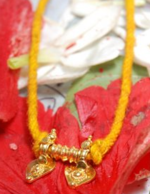Pushpaka Brahmin is a generic term that refers to a group of certain Hindu Ambalavasi castes in Kerala.[1]
The term Pushpaka applies primarily to a caste known itself as Pushpaka (or Pushpakan Unni) in South Kerala (Travancore). Pushpakas were assigned the job of tending flowers and making garlands in the Hindu temples. They were also given rights to teach sacred texts including Sanskrit language in the Pathasalas associated with Hindu temples in Central and North Kerala. They are often referred to as Pushpakas owing to their cultural similarity with Pushpakas in South Kerala. In addition to these two castes, the term Pushpaka Brahmin, in a wider sense, applies to certain other Ambalavasi castes like Theeyatt Unnis, Kurukkals, Puppallis, Plappallis, Nambidis, Nambeesans and Daivampadis. All these castes are associated with temple related jobs who render services to the temple and have many socio-cultural similarities.

Community welfare
editNowadays, Pushpaka Brahmins are reluctant to cling to their traditional line of profession like priesthood,[2] adhyapanam (teaching) in Pathasalas, malakettu (garland making), vilakkeduppu (lamp bearing), thidambettu (bearing replica of deity on religious procession) etc. due to low income from these professions.
Sree Pushpakabrahmana Seva Sangham is an organisation working for the welfare of Pushpaka Brahmin castes.[citation needed]
References
edit- ^ Rose, Suma (2004). Polity, Society, and Women: With Special Reference to Travancore, 1700-1900 A.D. Carmel International Publishing House. p. 217. ISBN 9788187655374. Retrieved 2013-04-30.
- ^ "62 Priests to Travancore Devaswam Board" (in Malayalam). Malayala Manorama. Quote:തിരുവിതാംകൂർ ദേവസ്വം ബോർഡ് ക്ഷേത്രങ്ങളിലേക്ക് 62 ശാന്തിക്കാർ കൂടി - നായർ, വാരിയർ, മാരാർ, പുഷ്പകർ എന്നീ വിഭാഗങ്ങളിൽനിന്ന് ആരുമില്ല.